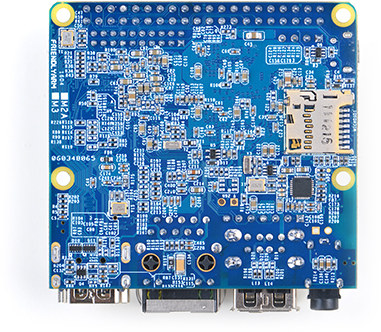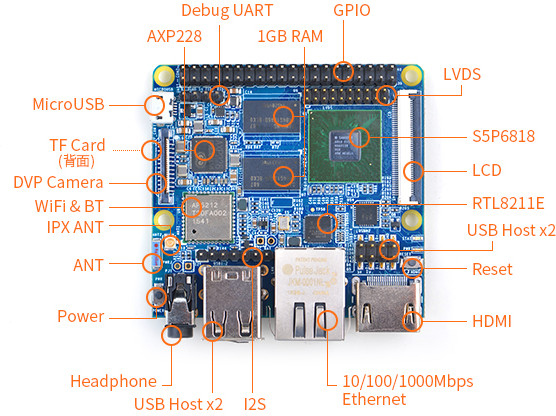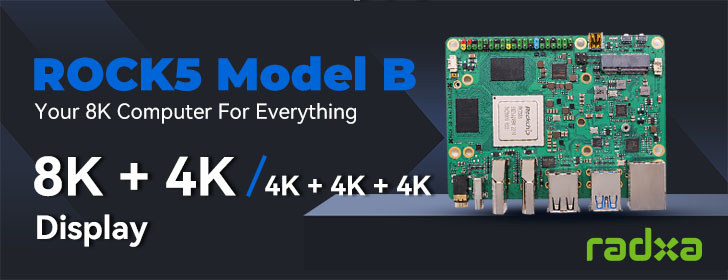A few weeks after introducing NanoPC-T3 single board computer based on Samsung S5P6818 octa-core Cortex A53 processor, FriendlyARM is now launching a cost-down version called NanoPi M3 for just $35 with 1GB RAM, and booting from a micro SD card.
NanoPi M3 board specifications:
- SoC – Samsung S5P6818 octa core Cortex A53 processor @ up to 1.4GHz with Mali-400MP GPU
- System Memory – 1 GB 32-bit DDR3
- Storage – 1x micro SD card slot
- Connectivity – Gigabit Ethernet (RTL8211E), 802.11 b/g/n WiFi and Bluetooth LE 4.0 (Ampak AP6212) with on-board chip antenna and IPX antenna connector
- Video Output / Display I/F – HDMI 1.4a up to 1080p60, LVDS, parallel RGB LCD
- Audio I/O – HDMI, 3.5mm audio jack, 7-pin I2S header
- Camera – 1x DVP interface
- USB – 2x USB 2.0 type A host ports; 1x micro USB 2.0 client port; 2x USB 2.0 host ports via 8-pin header
- Expansions Headers – 40-pin header
- Debugging – 4-pin header for serial console
- Misc – Power & reset buttons; power status LEDs.
- Power Supply – 5V/2A via micro USB port; AXP228 PMIC
- Dimension – 64 x 60 mm (6-layer PCB)
 The board supports Android and Debian running on top of Linux 3.4. More technical details can be found in the Wiki. Samsung S5P processors are actually made by Nexell, and not supported at all in mainline Linux, so don’t expect support for a more recent kernel. Arnd Bergmann, one of Linux ARM SoC maintainers, even referred the code to as “awful“:
The board supports Android and Debian running on top of Linux 3.4. More technical details can be found in the Wiki. Samsung S5P processors are actually made by Nexell, and not supported at all in mainline Linux, so don’t expect support for a more recent kernel. Arnd Bergmann, one of Linux ARM SoC maintainers, even referred the code to as “awful“:
Source code is available but awful.
…
Specifically, this is a Linux-3.4 kernel that looks more like a Linux-2.6.28 platform port that was forward-ported.
Nevertheless, at $35 plus shipping ($10 in my case), NanoPi-M3 must be the cheapest octa-core board available on the market so far. Visit the product page for more details and/or purchase the board.

Jean-Luc started CNX Software in 2010 as a part-time endeavor, before quitting his job as a software engineering manager, and starting to write daily news, and reviews full time later in 2011.
Support CNX Software! Donate via cryptocurrencies, become a Patron on Patreon, or purchase goods on Amazon or Aliexpress





a x2 A72 + x2 A53 would be much better imo.
And again, no usb3. Dammit.
Looks like a great dev-board, a shame the kernel isn’t mainline and there will be probably no effort to mainline it. Otherwise for me it has everything I need, except sata.
> Power Supply – 5V/2A via power barrel;
It seems microUSB power and USB hub chip, again.
S5P6818 seems to be one of the very few octa-core A53s where the two clusters are identical. Most A53 octa-cores try to ‘big.LITTLE’ their A53s, which is not particularly beneficial for non-phone purposes.
Strange design. Crappy Micro USB used for DC-IN, all 4 USB ports behind an internal USB hub connected to the one USB 2.0 HSIC port leaving the other USB 2.0 host port unused. No possibility to mount an appropriate heatsink (compare with the bigger sibling NanoPC-T3 please where a rather huge heatsink is mounted — maybe for a reason?) and the cherry on top is an old 32-bit only 3.4.39 kernel the Cortex-A53 cores should run with.
No mainline kernel (support or effort) -> another board to be ignored.
@dvl36
You’re right. Sorry, I did some copy/paste from NanoPC-T3, and missed that difference.
I agree with Aaa, this board is worthless without proper software support. Unless someone is going to get mainline support for the S5P6818, I see no reason to buy this. The only upside to this board is the octa core.
@tkaiser @cnxsoft
Time for a tkaiser guest-post round up of available Asian ARM dev boards – assessed on performance, Linux support, IO, design, build quality (?), suitability for certain roles (NAS, desktop substitute, Kodi box?)
seems that the mali gpu is probably MP4
http://wiki.friendlyarm.com/wiki/images/8/8b/SEC_S5P6818X_Users_Manual_preliminary_Ver_0.00.pdf
page 15 : four PP (pixel processors)
Still makes a Raspberry pi 3 look over priced tat .
Who here ever worked on a specific linux port ?
I didn’t see how to get a 2gb ram version. The buy page shows 60 bucks to get a board, and a case option as well as a heatsink option, but didn’t see the 2gb.
The shopping site needs a bit of attention to make sense to me.
Interesting that this is the samsung chip. I wonder if there is any firmware to liven up the other bits of phone stuff on it, or is this silicon stripped of the phone features? A lot of the other parts I see are featured for tablets which do not support phone options, but this one might.
I wish some more vendors doing the chips would support true GB nics and sata, rather than bridging with USB.
The USB is the only media interface that these vendors have that gets data in and out to answer an earlier question, so the more you put directly on a USB hub on the chip the better. If the hub is outside that adds a layer of delay, and also implies fewer data paths possible concurrently.
I know few of the chips have more than one active USB and have external to the SOC hubs.
Is anyone but Freescale / NXP doing chips with real SATA and nics?
@theguyuk
Well the RPi 3 might seem overprices but you’re getting a lot of support, mainline kernel, open source GPU and so on. With this one you’re getting a kernel no one will bother with in a few months , a binary GPU driver , little support, a small community and so on.
Don’t get me wrong, I do understand what you’re saying and you have a point too but while thinking about this I realized the things I said above… there are certain big advantages that the Pi still have because the other ARM SOC vendors just don’t give a crap and just implement their mobile ARM Linux strategy of snaphot kernel + lots of binary crap drivers , release and forget.
I will buy if I has 2GB ram. Next to another board
Today many embedded linux boards shown up with a much more advanced CPU core and peripherals but we have to figure out for a software support side also.
That’s why a board with most active community is the most interesting to get in.
I think Raspberry Pi still keep its place…
It is worth remembering that Raspbian was provided by fans and not Raspberry foundation. Raspbian also say they support education aims like Raspberry Pi foundation but both limit themselves to one soc tree.
Which is odd as Eben Upton is on video and record saying he wants others to make other boards, yet Raspberry fans attack other board makers and Raspberry foundation moan about others riding their coat tails.
@Theguyuk
Regardless, it came in large numbers, in a way that was easy to buy, with a lot of support already, with publicity that it was aimed at school kids, and that drove the user support community. Most importantly it was designed in an English-speaking country and is driven from there. This product is Chinese. There is no commitment, and likely f-all support. I’m sure it’s a very good product for propeller heads, but for ordinary hobbyists and particularly kids, it’s going nowhere.
@Brian Williams
how being developed (and “driven from there” – not the least thing in your consideration, I believe) in “english speaking” country may help end users, hobbyists etc? how does being english speaking developed and driven from there, helps with quality, feature set, feature set/price ratio, documentation, support etc.
It’s so stupid to distinguish that way, so lame. No matter how are speaking those developers and how are speaking right holders, as well as whether they are gays or maybe yet else, this all doesn’t matter, – the product may be a whole crap or may be brilliance. You know your raspberry pi still ultimately is madeof chinese produced parts. Isn’t it?
For example for me, messing around UEFI, your raspberry pi is a crap, since I hate when I can not controll a platform even at the firmware level, since they chose that ugly VC behind the scene approach. And neither their english speaking nor yours chauvinistic speach help with this. Ugh.
@cortex-a72: what you just wrote would be lame if it wasn’t so terribly stupid.
@Renw0rp
If you think “english speaking” is the “Most importantly” thing for the board, then your estimation of stupidity of someone else words is kinda an oxymoron, you know.
You read what you want to read and it’s pretty obvious from your reaction that you have some deeper problem in your head. Being non-native English speaker I had no problem understanding what Brian meant. Definitely there was nothing discriminating in his comment (unless you state that truth is discriminating). Like many political correct leftists you just bring up the topic of gays in totally not related discussion, you only forgot to mention “nazi” or “hitler” for the completeness of your argumentation.
PS. Never was a fan of compromise raspi made, even less of a fan after the change of raspi foundation/Eben Upton attitude (after commercial success), but they still offer much more openess and documentation than most of the competition.
@Renw0rp
you know I might be sarcastic how you suck as a psychologist, but I don’t want to, I just say it straight – you sound like a creepy pharisee, because this line
“Most importantly it was designed in an English-speaking country and is driven from there”
says all by itself. And If you read about “support, availability, usability” and other nice -abilities from it, and all this ” FOR KIDZZZ!!!111″, than I may assume such things like “dick sucking and ass licking” sound for you as a “good opportunities”, if they come from “right persons”, right? Do mention those leftists these things?
@cortex-a72
Ok, I don’t know how retarded person you must be, but it seems that you need English-to-English translation. Brian just wrote that companies from English-speaking countries (probably more broadly “Western countries”) offer more support and commitment to their products than Chinese companies. Just that, nothing more. The rest is just your sick imagination. No idea where you took the sucking and licking thing from, really WTF?!?!